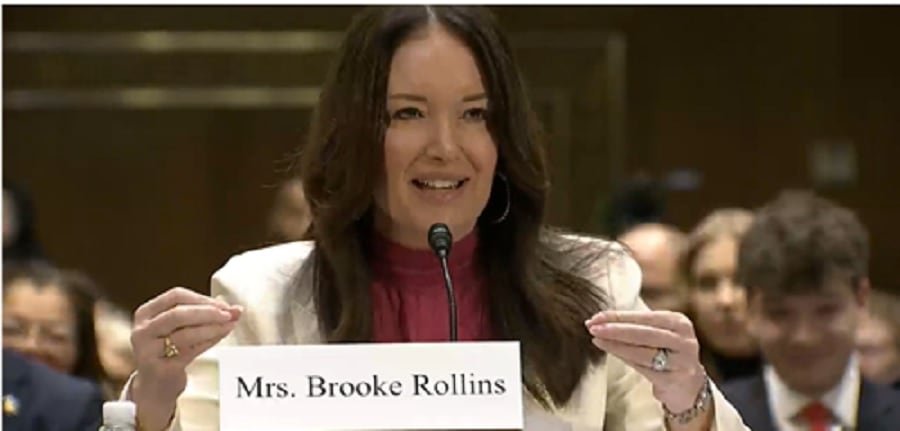If USDA Secretary Nominee Brooke Rollins is confirmed, Americans who receive federal supplemental food assistance may face stricter work requirements and reduced benefits, farmers and ranchers may struggle to find sufficient employees to harvest crops and school lunches may have fewer ultra-processed foods.
In a wide-ranging confirmation hearing held Jan. 23 by the US Senate Committee on Agriculture, Nutrition and Forestry, legislators also grilled Rollins on her positions on meat packer safety, California’s ban on food from animals in ‘extreme confinement’ and the impact of potential tariff hikes and trade negotiations on grocery prices and inflation.
In her opening statement, Rollins outlined five priorities “for day one,” including ensuring efficient deployment of disaster assistance, tackling animal disease outbreaks, modernizing USDA to respond to the “clear needs and the desires of the American people,” and ensuring rural communities are “equipped and supported to prosper,” which includes development programs, “strong and steady” exports, reducing “burdensome and costly regulations” and ensuring nutrition programs are “effective and efficient.” She also committed to helping pass a five year Farm Bill.
While many committee members agreed those are sound goals and two even said her confirmation was a “no brainer,” the group was divided on how Rollins can best achieve them.
Proposed changes to SNAP could reduce how much beneficiaries have to spend
Among the most divisive goals is ensuring nutrition programs, including the Supplemental Nutrition Assistance Program (SNAP) and the Special Supplemental Nutrition Program for Women, Infants and Children (WIC), are “effective and efficient.”
Rollins repeatedly recalled how she was raised in a small town by a single mom and “didn’t have much,” and while she said she never participated in USDA’s nutrition programs she said is committed to ensuring SNAP “continues on a course of being effective and efficient.”
But, she added, “it is also imperative to us that every taxpayer dollar that is spent in support of these programs, we fully understand that it is reaching its intended recipient and that that recipient is able to use it effectively and efficiently for true nutrition reasons.”
As such, she confirmed that she believes in work requirements – a flashpoint for several committee members and wedge between democrats and republicans broadly.
Currently, non-elderly adults without children in their homes are limited to three months of SNAP benefits every three years unless they meet a 20-hour-per-week work requirement or are otherwise exempt. President Trump, many republican lawmakers and conservative policy groups want to limit exemption for SNAP recipients in areas with limited employment options and for some veterans, unhoused recipients and 18- to 24-year-olds who have aged out of foster care. They also want to expand the three-month limit to adults 55 to 64 years old and to adults who live which children 7 years and older, among other proposed changes.
Rollins acknowledged she is not fully versed in the different proposals for additional work requirements, but said she plans to get “more in the weeds on this, if confirmed,” and looks forward to working with committee members to ensure their “concerns are part of the education process” for her.
Before backing changes, Sen. Tina Smith, D-Minn., urged Rollins to consider why some adults are exempt from the work requirements, including because they are taking care of children, incapacitated, participating in an alcohol or drug treatment program” or other reasons.
“I don’t think that this is a good place to be looking for extra dollars when we have so many people that are struggling with food insecurity, even though they are working one or maybe two or three jobs,” Smith said.
Georgia’s junior Democratic Senator Raphael Warnock echoed Smith’s concerns but used terminology often favored by republicans.
“One of the things that I am concerned about are proposals to slash this critical assistance and create additional work verification red tape for families participating in these programs. Do you think creating more bureaucratic red tape for families will help them purchase nutritious food?” he asked.
Rollins countered that she “obviously” does not “like the words ‘bureaucracy’ or ‘red tape,’” but wants to “ensure we have set up the appropriate lifelines and the appropriate structure so we can get these resources to the families that need them the most.”
“It is extremely important that we take a wholesale look at every one of these programs and ensure that they are serving the people that are meeting the programs,” she said.
“Remember that most poor people are children. SNAP assists children, seniors, veterans and folks with disabilities out of poverty and has proven to reduce health care costs and stimulate our local economies. If you are confirmed, I hope we can find ways to work together to ensure our most vulnerable families and our neighbors can afford groceries,” Warnock rebutted.
School meals: Should students be served UPFs, whole milk?
Another “priority” for Rollins to ensure children have access to sufficient healthy nutrition is to reassess what foods and beverages qualify for inclusion in school meals.
Rollins said she agreed with Sen. Cory Booker, D-NJ, that the amount of ultra-processed foods (UPFs) in the school meal program should be reduced to help improve children’s health and reduce rates of teenagers who have pre-diabetes and other diet-related chronic disease.
She also laughed as Sen. Roger Marshall, R-Kan., poured and drank a glass of whole milk before asking if she agreed that “whole milk is the most nutritious drink known to humankind and belongs in our school lunches.”
Rollins recalled drinking whole milk as a child and said his assessment of the beverage “hits home to me very, very quickly.”
Deportation threats could slash workforce for farmers, ranchers
Rollins' position on illegal immigration also raised concerns among several senators who noted many of the people who harvest US crops and help manage livestock on ranches are immigrants.
The American First Policy Institute, a non-profit Rollins founded, has called for “deportation at a scale that actually matters,” which Sen. Dick Durbin, D-Ill., characterized as “massive” and as a threat to US harvests.
“Forty percent of the farm workers in this country are undocumented, and if they are deported, what are the farmers going to do? For a lot of them, and for a lot of different industries, immigration is critical,” he said, before asking “Can we expect this administration to be raiding farms and going after immigrant farm workers?”
Rollins responded she is committed to helping Trump deploy his agenda effectively while also defending farmers and ranchers, which she acknowledged may sound like a conflict. But she proposed modernizing the H-2A visa program, which allows US employers to temporarily fill agriculture jobs with foreign nationals if they meet specific regulatory requirements.
She added the “first round” of immigration sweeps will be aimed at those who have committed crimes within US boarders in the last four years.
“We will follow the data. We will follow and listen to our farmers and ranchers as this is moving, and my commitment is to work with all of you to solve and do everything we can to make sure that none of these farms or dairy producers are put out of business,” she said.
Could farmers be caught in the crossfire of a trade war?
Several senators also grilled Rollins about the potential impact on farmers and ranchers if Trump follows through on his threat to raise tariffs, which they argue could start a trade war with farmers caught in the crossfire.
Tariffs instituted during Trump’s first administration started a trade war in which China countered a 25% tariff on their batteries, TVs and medical devices with a 25% tariff on soybeans, fruit, pork and other items – making it so many farmers could not sell their goods, recalled Sen. Elissa Slotkin, D-Mich.
“People rightfully felt like our farmers were getting the shaft,” and ultimately “paid them off” with $23 billion in subsidies, she added.
To avoid repeating this cycle, Slotkin asked Rollins if she would “throw your body in front of a bus to make sure that any political talking points on tariffs that may sound good are actually truly tested against how it will impact our farmers?”
Rollins responded that she would “work around the clock to ensure our ag communities across this country are represented in those discussions” and said she would “do everything in my power to elevate, preserve, honor, conserve that backbone of America.”
The hyperbole of the exchange was tempered slightly by an earlier exchange in which Rollins said Trump believes tariffs are an important tool to ensure a thriving economy and that the administration is “prepared to execute something similar” to the President’s first term in office. In that scenario, she said if she is confirmed she will work with the White House to “close those holes for our farmers and ranchers moving forward.”
Prop 12: Could USDA reverse California’s controversial ban on meat from confined pigs?
Conflicting concerns among committee members about the fate of California’s Proposition 12 appeared to place Rollins in opposition of traditional republican values and call into question whether the issue could be reopened despite being settled previously by the Supreme Court.
In May 2023, the US Supreme Court upheld California Prop 12, which bans the sale of pork that does not meet its heightened animal welfare standards – rejecting the National Pork Producers’ and American Farm Bureau Federation’s argument that the proposition violates the US Constitution because it “impermissibly” hindered interstate commerce.
Sen. Joni Ernst, R-Iowa, appears to have successfully conscripted Rollins support for reversing Prop 12.
“I’m a federalism believer. I believe in the founders’ vision of the 10th Amendment, and the government closest to the people is the government that should be most active,” said Rollins. “But,” she added, “there is no doubt that its not just affecting California. It is affecting multitudes of other states, multitudes of other parts of the ag committee, including our hog family farms in Iowa.”
As such, Rollins told Ernst she looks forward to working together to reverse Prop 12.
Booker later countered that he hoped Rollins would be open to discussing the benefits of Prop 12 and the potential negative consequences of trying to reverse it.
When pressed for support on another facet of the animal protein industry, Rollins demurred.
Booker asked for her commitment to use the agency’s purchasing power to force meat packers to end “horrific abuses,” including running lines so quickly that workers’ health and long-term well-being were at risk and allegedly violating child labor laws.
“I have not spent enough time to fully understand” safety concerns raised by USDA and others at meat packing facilities, “to commit one way or the other, but I absolutely look forward to working with you and learning more about the issue,” Rollins said.
After nearly four hours of questions from legislators, Committee Chairman Sen. John Boozman, R-Ark., thanked Rollins and advised committee members to submit any additional questions by 6 pm Jan. 24 for consideration before they collectively decide if Rollins will be confirmed.




